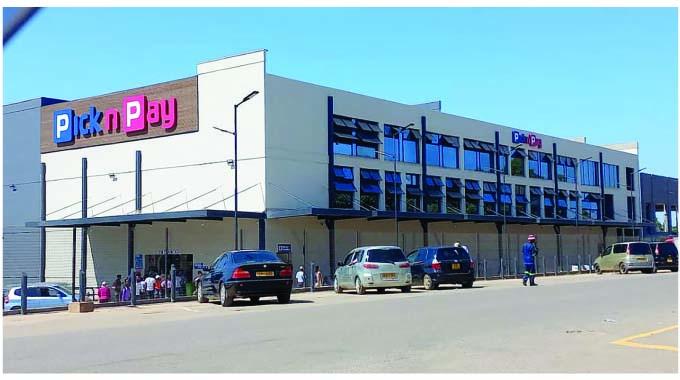News / National
Pick n Pay writes off entire Zimbabwe investment
30 May 2025 at 11:13hrs |
19 Views

South African retail giant Pick n Pay Group Limited has reported an unrecognised loss of R51 million from its Zimbabwean associate, TM Supermarkets, for the 53 weeks ending March 2, 2025 - marking a dramatic reversal from a R212 million net contribution recorded in the previous financial year.
The losses, driven primarily by Zimbabwe's severe currency volatility and hyperinflationary pressures, have prompted Pick n Pay to fully impair its 49% stake in TM Supermarkets. The group has written down the investment by R254 million, effectively reducing its carrying value to zero.
Pick n Pay operates in Zimbabwe through a joint venture with TM Supermarkets, the retail division of Meikles Limited. While the partnership had been profitable in past years, recent economic instability has rendered the operation loss-making.
"The group accounts for its investment in associate under the equity method of accounting in accordance with IAS 28, Investment in Associates and Joint Ventures," Pick n Pay said in its audited financial statements.
Zimbabwe continues to be assessed as a hyperinflationary economy, and as such, the group applied IAS 29 – Financial Reporting in Hyperinflationary Economies in its treatment of TM's financials.
"The group's investment in TM Supermarkets was impaired to nil in the prior period," it noted, adding that it no longer recognises any share of profits or losses from TM, given the investment's carrying value has now been reduced to zero.
Despite maintaining a solid footprint of 74 stores, TM Supermarkets has struggled to remain viable under Zimbabwe's worsening macroeconomic conditions, including an unstable local currency and rising operating costs. The exchange rate as of February 28, 2025, stood at US$1:R18.5, further highlighting the challenges of converting local earnings into rand-based returns.
Pick n Pay's total group turnover rose by 3.2% to R115.92 billion during the review period. However, the Rest of Africa segment - which includes operations in Zimbabwe, Zambia, Namibia, and Botswana - contributed R3.4 billion, down from R3.61 billion in 2024.
Within this segment, turnover declined 5.7%, with performance hindered by currency devaluation in Zambia and lower sales in Namibia, where the franchise agreement is nearing its end.
"Solid progress was made on both strategic initiatives during the financial year 2025. Pro forma 52/52-week turnover declined 0.3%, with Pick n Pay South Africa flat and Rest of Africa declining 5.7%," the group said.
Amid growing concerns over regional performance, Pick n Pay said it had assessed operational challenges across its African footprint and was developing plans to improve profitability in key markets outside South Africa.
Nonetheless, Zimbabwe's case appears particularly bleak. The unrecognised R51 million loss and full impairment underscore the group's declining optimism in TM Supermarkets, once seen as a foothold into a promising regional market.
With inflation, exchange rate volatility, and policy uncertainty continuing to disrupt operations in Zimbabwe, analysts suggest that Pick n Pay's future involvement in the country may remain minimal unless macroeconomic reforms restore stability.
As of now, TM Supermarkets remains a non-contributing entity on Pick n Pay's books, despite its extensive store network and historic market presence.
The losses, driven primarily by Zimbabwe's severe currency volatility and hyperinflationary pressures, have prompted Pick n Pay to fully impair its 49% stake in TM Supermarkets. The group has written down the investment by R254 million, effectively reducing its carrying value to zero.
Pick n Pay operates in Zimbabwe through a joint venture with TM Supermarkets, the retail division of Meikles Limited. While the partnership had been profitable in past years, recent economic instability has rendered the operation loss-making.
"The group accounts for its investment in associate under the equity method of accounting in accordance with IAS 28, Investment in Associates and Joint Ventures," Pick n Pay said in its audited financial statements.
Zimbabwe continues to be assessed as a hyperinflationary economy, and as such, the group applied IAS 29 – Financial Reporting in Hyperinflationary Economies in its treatment of TM's financials.
"The group's investment in TM Supermarkets was impaired to nil in the prior period," it noted, adding that it no longer recognises any share of profits or losses from TM, given the investment's carrying value has now been reduced to zero.
Despite maintaining a solid footprint of 74 stores, TM Supermarkets has struggled to remain viable under Zimbabwe's worsening macroeconomic conditions, including an unstable local currency and rising operating costs. The exchange rate as of February 28, 2025, stood at US$1:R18.5, further highlighting the challenges of converting local earnings into rand-based returns.
Within this segment, turnover declined 5.7%, with performance hindered by currency devaluation in Zambia and lower sales in Namibia, where the franchise agreement is nearing its end.
"Solid progress was made on both strategic initiatives during the financial year 2025. Pro forma 52/52-week turnover declined 0.3%, with Pick n Pay South Africa flat and Rest of Africa declining 5.7%," the group said.
Amid growing concerns over regional performance, Pick n Pay said it had assessed operational challenges across its African footprint and was developing plans to improve profitability in key markets outside South Africa.
Nonetheless, Zimbabwe's case appears particularly bleak. The unrecognised R51 million loss and full impairment underscore the group's declining optimism in TM Supermarkets, once seen as a foothold into a promising regional market.
With inflation, exchange rate volatility, and policy uncertainty continuing to disrupt operations in Zimbabwe, analysts suggest that Pick n Pay's future involvement in the country may remain minimal unless macroeconomic reforms restore stability.
As of now, TM Supermarkets remains a non-contributing entity on Pick n Pay's books, despite its extensive store network and historic market presence.
Source - Zimbabwe Independent
Join the discussion
Loading comments…
































